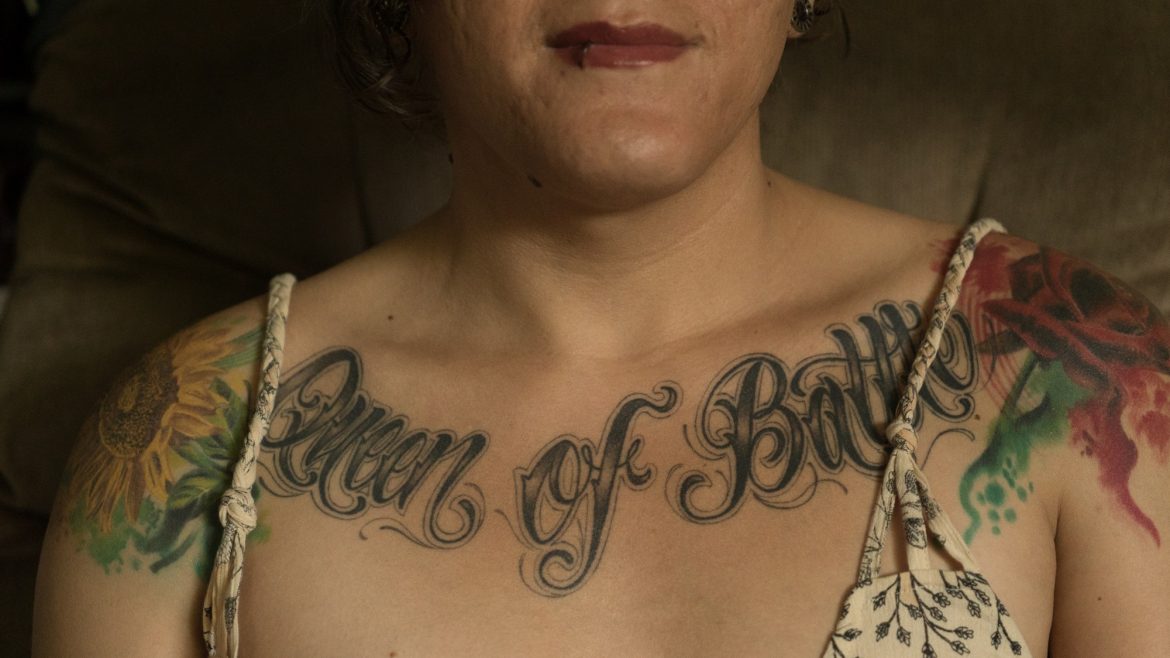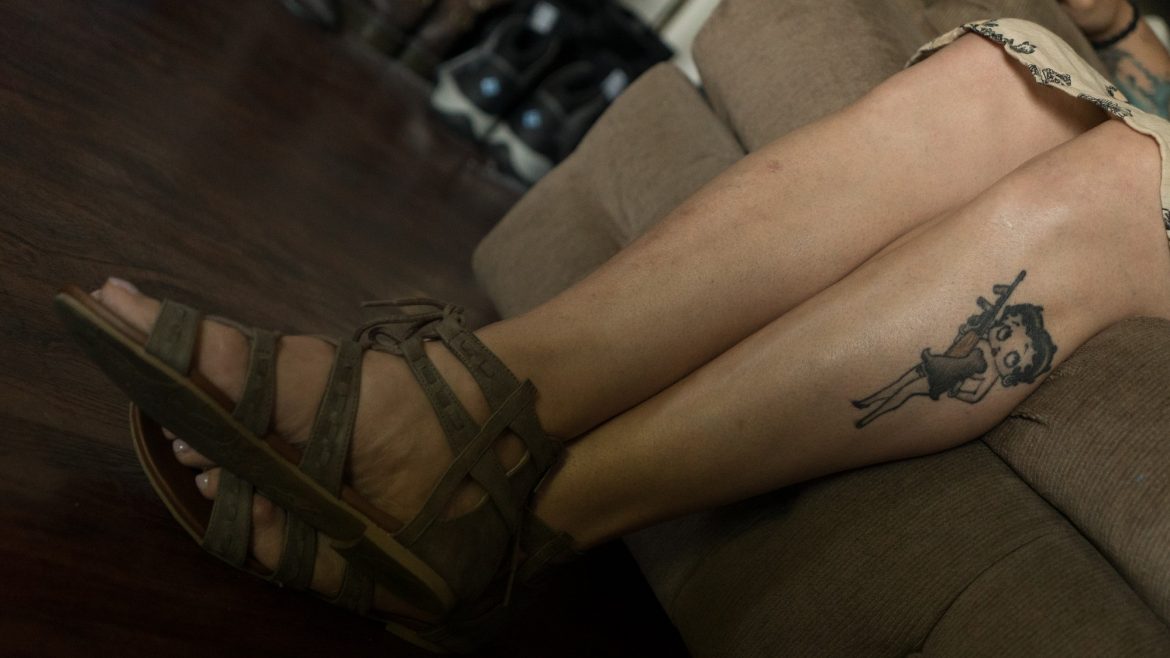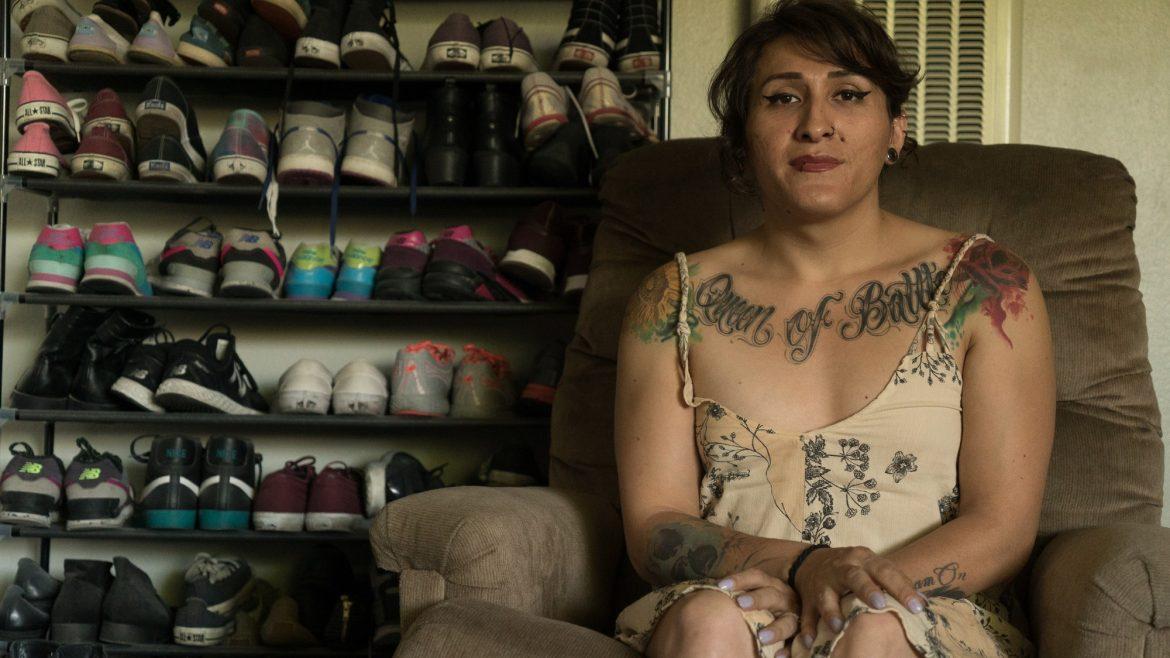In war, the infantry is known as the “Queen of Battle” for its ability to move anywhere across the board. “Queen of Battle” is tattooed across the chest of Madeline Martinez to represent the years she served in the infantry.
Martinez hoped the military would teach her how to be a man. Martinez was able to successfully transition, but not before facing the hypermasculinity that lives in the military.
“If I was to transition, I’d lose all my family and lose everything, then get killed in a hate crime. They don’t put memorials up for trans women, they put memorials up for soldiers,” Martinez said.
Martinez says the military wasn’t something she ever planned on joining. Martinez had a lot of issues with her gender identity and felt the need to prove her masculinity.
Originally, Martinez joined the military for the benefits. Her wife became ill in 2008 and joining the military would give them health insurance, something they didn’t have access to before.
“I was drowning in life and I didn’t want to live anymore,” Martinez said. “The military seemed like an easy out because if I joined in a time of war maybe I could go to the front lines and not come back.”

Martinez still had her doubts. She noticed the lack of representation transgender men and women who died going to war face. According to Martinez, these soldiers aren’t seen as heroes and their true new identities are ignored.
Martinez was first stationed in El Paso, Texas. She had to learn how to balance her gender identity with the military. Although she tried not to focus on it, she always believed that her natural female characteristics bled out of her. To deflect questions of her gender identity and sexuality, Martinez would attempt to change the conversation. She would try to fight soldiers, but others would step in and remind her that she could lose rank.
“Anger and happiness are the only things you can share in guy world,” Martinez said.
While in El Paso, Martinez created a second Facebook account that would allow her to express her true gender identity. She started communicating with drag queens in her area and would post pictures in makeup and feminine clothing.
She found herself becoming friends with the soldier’s wives, but not being able to express her true identity pushed her to become an alcoholic.
Martinez first confessed her conflict of gender identity with another soldier when she was deployed to Afghanistan. During this time, another soldier confessed his sexual history with men to her. This gave her the confidence to reveal how she had never felt like a man and that she sometimes dressed as that of a woman.
This was short-lived; the other soldiers found her second Facebook account. Martinez immediately tried to shut it down, but other soldiers were already treating her differently. Martinez was transferred to a new unit. She believed the soldiers were relieved because they didn’t know how to act around her.

Six months after Afghanistan, Martinez was stationed in Georgia. Martinez decided she was going to attempt masculinity and again felt the need to prove she belonged there. After three months, Martinez found out she was being discharged for chronic cluster headaches, due to a brain injury she sustained in Afghanistan.
Stressed and on the verge of suicide Martinez decided that it was time to start living as her authentic self. On April 2, 2013, Martinez started hormone replacement therapy. By June, Martinez had started to see changes in her body.
“I didn’t want to kill myself without having a glimpse of what my life could be,” Martinez said.
By January 2014, she had developed full breasts that made soldiers around her feel uncomfortable. Changes in her face shape, fat displacement and voice became more obvious. Martinez said that once her voice became higher a sergeant told her “You need to butch up your voice or not talk to anyone.” She had to relearn how to talk deeper around certain people.
Martinez was part of the first SPART*A Convention, an LGBT military organization designed to support transgender soldiers and veterans. She was part of the first group to discuss the push for transgender rights in the military.
“Being able to talk to people about my issues and being an out trans soldier in the climate we were in, it was really uplifting knowing that other people were in the same position as me or had the same fears as me,” Martinez said.
The push for these issues continues today as President Trump attempted to ban transgender people from recruiting in the military.
Twenty-one year old Alexis Martinez, Martinez’s current wife, calls her wife brave and finds the policy infuriating. She believes it isn’t right to encourage people to be open then take away their job.
“You can’t ban people who are willing to fight because there are so many people who aren’t willing to fight,” Alexis Martinez said.
Martinez left the military on good terms. She believes she didn’t face discrimination while in the military because her unit liked the person she was.
“I was a person finally,” Martinez said. “They were finally talking to someone who existed.”
Editors note 9/04/18: Previous versions of this article had offensive terminology used in negative depiction of trans narrative. This article has been since been updated or corrected to remove the misinformation.

















